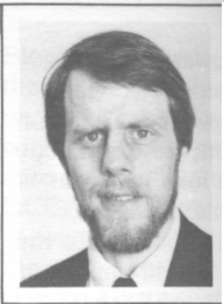 |
Home | Search | Browse | About IPO | Staff | Links |
 |
Home | Search | Browse | About IPO | Staff | Links |
|
Washington Simon's second-year focus: jobs, higher education  By CHARLES J. ABBOTT SOME things stick in your mind. For instance, there was a soft-drink commercial several years ago in which an aging hippie talked about re-evaluating his life now that he had a family. He even had to reconsider loyalty to a cola, he said, when he discovered a different drink tasted better. "Agonizing reappraisal," the character declared in delivering the endorsement. Similarly, there was a vivid moment 19 months ago when Paul Simon, then a five-term southern Illinois congressman, was describing the lure of running for the Senate. He held out his hands, palms cupped as if they were the trays in a set of scales and he was balancing his future in them. It would cost millions of dollars to run for the Senate but, Simon said, "I am interested that views I believe in and feel strongly about don't get buried. You have a better chance to be heard in the Senate." Simon has been proving the accuracy of that observation for a year now. He has taken a prominent role on human rights and blocked temporarily three judicial nominees. When his staff is asked to list his major activities, the two-and-one-half page list roams from the Conrail sale to a constitutional amendment to balance the budget and reform of campaign finance. In an interview, Simon pointed to the wider range of action allowed to senators. The day before, he had proposed two amendments to the new farm bill and planned to offer yet another. In the House, where there is great reliance on the committee system and leaders can limit the number of floor amendments, "I didn't introduce any amendments on a farm bill," he said. "You just have a flexibility to get involved," Simon said. Simon's work diet in the Senate is filled with meaty items like federal policy on education, economic development and improving international relations. He has spent time in working on details rather than floor speeches. It is typical of Simon. He is a hard-working, reliable man who does not try to be flashy. But there are moments when an observer can wonder if there are more dimensions to him. Simon broke the news, just days before the November summit, that the Soviet Union had decided to give exit visas to eight "divided" spouses and to a former Chicagoan who had been trying for 10 years to emigrate. He dropped some timely hints about where Chrysler Corp. and Mitsubishi Motors Corp. would put their joint-venture plant. And there is the Democracy Fund, a political action committee Simon sponsors. There are 4,000 PACs registered with the Federal Election Commission, but only a couple of dozen can be tied to congressmen. Some of them are senators with well-known desires for advancement. The Democracy Fund is a relatively modest operation, raising $43,800 in early 1985. "It is simply a way of being helpful to people who are in races," Simon said, and it will concentrate on midwestern congressional races. Taken together, those events could hint at a bit of ambition in Simon, an adjective not usually linked with him despite his tenure in a profession that demands, to put it mildly, a sense of self-worth. Remember, too, Simon got to the Senate by entering a four-way primary and facing a tough incumbent. A lot of people would take a pass in that situation. That leads to the question: Should a scale of greater expectation and judgment be applied to Simon in his new role? "Obviously, people in the Senate are not without ambition," Simon said when the question was posed to him but pointed to a good number of activities — closed hearings, years of work on "refusednik" cases — that do not win headlines or pay off in public. Nor does he accept the premise that he is doing more now. "I would not say [I'm] more active — I am basically a workaholic. There is greater visibility," he said, for what a senator is doing because senators get more public attention. The 1984 edition of the Almanac of American Politics, published well before Simon got into the Senate race, noted his wide interests and concluded, "Simon cannot be classed as a legislative power, but he has the power to make a difference on issues he cares about; and if he has not been a leader in some of the major fights before Congress, he has the ability to raise — and make a difference on — issues which might otherwise be neglected were he not working on them," "I think that's accurate for me in the Senate, too," Simon said, and soon afterward dismissed queries about his PAC with "I have no ambitions." For his second year in the Senate, Simon wants to be more active on education issues — "It is time to renew the basic federal law on support of higher education" — and on jobs creation. Both were areas of concentration for Simon in the House. It will be interesting to see how he fares in the Senate. You can bet he will be heard, perhaps with palms cupped, asking for a reappraisal of policies so that no view is muted or overlooked. 34/January 1986/Illinois Issues |
|
|